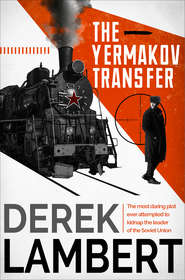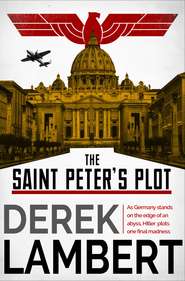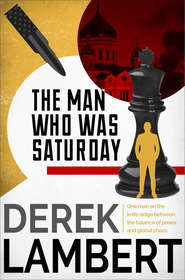По всем вопросам обращайтесь на: info@litportal.ru
(©) 2003-2024.
✖
The Red House
Автор
Год написания книги
2018
Настройки чтения
Размер шрифта
Высота строк
Поля
But he wanted to see it by himself. Gary Cooper walking lone and tall down Fifth Avenue. Compromise—the dress-sword of the diplomat. ‘I’ll meet you later and we’ll have lunch together.’
‘Meet me? Where? We don’t know anywhere in New York.’
He reacted swiftly. ‘At the top of the Empire State Building.’ He laughed aloud for the first time since the aircraft touched down at Kennedy Airport.
He felt as if he had been released from prison and was vaguely ashamed of his exhilaration. But a lot of conformity lies ahead, comrade.
It was midday. The snow had stopped and the sky above the rooftops of Lexington Avenue was polished blue. A few jewels still sparkled on the edge of the sidewalk but in the gutters the slush was ankle-deep. They had a lot to learn about street cleaning, he decided proudly.
The Gallery Drug Store, Marboro Books. Sixty, 59, 58 … 53, 52. He enjoyed the drugstores. ‘Meet you in the drugstore, buddy.’ Sulky-faced girls with bobbed hair wise-cracking with chunky athletes with greased or chopped hair (Hollywood 1935–50). But it needed courage to enter one. They would call him mister and ask where he came from.
Bookshops, delicatessens, restaurants … the luxury seemed cosy and refined in this particular avenue. East Side, West Side. Which was which? Grand Central Station, Central Park, Times Square, Fifth Avenue, the Waldorf Astoria, Harlem, Greenwich Village—that was all he knew.
He found courage and bought two newspapers from the front stall of a drugstore. The New York Times and the Daily News.
‘Thank you,’ he said.
‘You’re welcome,’ the girl sighed, yawning and chewing and talking simultaneously.
He tucked the papers under his arm like a baton wondering if he could be mistaken for an American. He looked behind to see if he was being followed. It didn’t look it but you could never tell.
What strikes me most? he asked himself, seeking first impressions for the album. It had to be the shops with their abundance of consumer goods: this he had been warned about—the products of exploitation, late participation in wars, geographical advantages, twenty million Soviets killed conquering the Hun. But the briefings hadn’t fully prepared him for the profusion, the multiplicity, the permutations of plenty. (How many variations of salad dressing could there be? How many odours of deodorant? and who wanted to smell of lemons or Tahitian lime anyway?) In Moscow he had queued for a ballpoint pen with a sputnik that slid up and down the stem.
And again, the cars—the automobiles. New Yorkers paraded in their cars. Vladimir Zhukov, crunching down Lexington Avenue with the enemy all about, lusted guiltily for a big tin fish with automatic drive and power-assisted windows. He was startled by the number of female drivers—girls with long, straight hair, smartly coiffured old ladies steering their vehicles like tank commanders. What happens to the babushkas? Do they have them put to sleep? or let them drive their tanks over the cliffs like lemmings?
He reached 42nd and turned right past Grand Central, remembering faintly from another life the stations of Moscow—cathedrals, fortresses, terminals of turreted grandeur where immigrant peasants wandered like bewildered insects.
He looked at the street numbers and knew with his mathematical certainty that he could never be really lost; just the same at that moment he was, gloriously and excitingly. Like a child trying to get lost and fearing the chilly second-thoughts of dusk.
Courage, comrade. He said to the cop frowning at the unplumbed depths of slush on a street corner, ‘Excuse me, please, can you tell me the way to the Empire State Building.’ His words froze and hung between the two of them.
The patrolman who had long sideburns and a squashed face said, ‘How’s that?’
Zhukov expelled the rush of words again, hating the sense of inferiority that accompanied them. Put this cop in Red Square and see how he managed.
‘Where you from, fella?’
‘Moscow.’
Enlightenment shifted the crumpled features around and Zhukov realized that it was a friendly face.
‘No kidding. One of those emigré guys, huh? And you don’t know where the Empire State is? How’s about that.’
Zhukov waited.
The patrolman said, ‘Two blocks down. Turn left down Fifth. You sure as hell can’t miss it. I guess that’s the one building you can’t miss.’
‘Thank you.’ Zhukov crossed the slush, wishing he didn’t look so conspicuous. Even though no one seemed to pay him much heed.
‘Okay, pal,’ said the patrolman. ‘Any time. Any time at all. Have a good day.’
The City Library. (Four million volumes.) Negroes, Italians, Poles, Swedes, Germans, Puerto Ricans (he presumed), hippies, producers in camel-hair coats, soldiers to be sacrificed in Vietnam, women in furs and boots as arrogant and vapid (he was sure) as fashion models, businessmen with slim black attaché cases—one there munching a hot-dog. All intent on something on this white melting day.
One thing he did not do: he did not walk along staring up at the narrow sky because that was the hallmark of the green horn. Which I am not, he thought. I am a representative of the greatest power on earth. It’s just that I’m a stranger. At which point he discovered that his head was tilting upwards like a peasant seeing his first aeroplane.
So there it was—a colossus of playbricks beneath him. Massive and vulnerable. You could crunch them, swipe them aside with one bear paw.
On the 102nd floor observatory, nicely placed at 1,050 feet, Vladimir Zhukov surveyed the enemy camp with awe and got annoyed about the awe.
He gazed south-west where the vanguard of the buildings gathered for approaching tourists. With the Statue of Liberty on sentry duty. He moved and sighted north towards what he thought was the Bronx, beyond a phalanx of skyscrapers. Difficult to believe that in one section of one storey of one of those obelisks, a business, an existence, a saga, could exist without awareness above or below.
To the north-east the metallic, ostentatious thrust of the Chrysler Building with, he surmised, the pygmy-giant of the United Nations close by; but within that cubist pygmy lay the power to curb so much capitalist expansionism.
The city, so beautifully exhibitionist, within the ice-blue perimeters of its rivers.
‘Sometimes snow and rain can be seen falling up.’
‘I know,’ Vladimir Zhukov said. ‘And the rain is sometimes red.’
He turned without surprise and faced Mikhail Brodsky.
The breakfast was called The Heavyweight. It consisted of a wafer of bacon, two rheumy fried eggs and three pancakes covered with maple syrup and crowned with a dollop of whipped cream. For your $1.25 you also got a small glass of orange juice, toast and coffee. It was, Zhukov thought, good value and totally disgusting He ate it with relish.
Brodsky ordered coffee, tapping the last grains of sugar from the paper sachet with his forefinger, leaking the last drop of cream from the tiny carton, his actions the legacy of a needy youth. Although the delicate bloom on his cheeks seemed to have surmounted bread and potatoes and blinis.
Brodsky tuned in with two bars and said, ‘I think this is more our style.’
More than what?
Brodsky cat-sipped at his coffee. ‘I feel at home in these places. With these people.’ He indicated the coffee shop’s occupants: a gaunt, white-haired man in a Stetson flirting grotesquely with the woman behind the counter; a starved little guy in a red checked lumber jacket continuing his life’s search for winners with a chewed fingernail; a bearded Negro in a cowboy jacket riding his chair like a horse; mother and son spooning banana splits, a salesman inside an overcoat collapsed by rain and snow.
The statement seemed to Zhukov to be an admission of inferiority. But he let it pass. ‘How did you find me up there?’ Either the room had been bugged or Valentina had told him or he’d been followed. Any one explanation wearied him.
‘It was not so remarkable. Your wife was still feeling tired and suggested that I meet you instead.’ He wiped his glasses, looking myopic and vulnerable. ‘And it’s good that we become friends because we shall be seeing a lot of each other in Washington. I think we should have a chat now before we leave. You see,’ he explained, ‘the weather has cleared and we shall be taking the shuttle this afternoon.’
‘So soon?’
‘Washington is your destination.’ He glanced around the café with a furtiveness as natural as sleeping and breathing.
‘So we are going to have a frank and open talk, are we?’
‘I hope so, comrade. I really hope so.’ The girlish hair fell about.
He pressed his loaded sinus with finger and thumb; nails pared and clean, hands hairless. His lashes brushed the lenses of his spectacles. He wore the same dark overcoat, the same woolly scarf that mothers made you wear, a thin grey tie.
‘Then tell me what happened at the Embassy this morning.’
‘It was all most unfortunate.’











